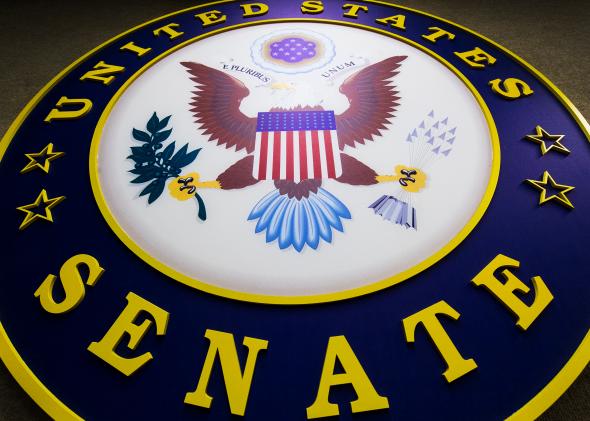Republicans Can Win the Senate Without Flipping Any Blue States

Photo by Paul J. Richards/AFP/Getty Images
While writing that post about Obama's poll numbers, I kept getting distracted by the math that defines every race this year. It doesn't really matter whether the president's national approval numbers are in the low 40s or the high 40s. National poll numbers include results from voters in California, Massachusetts, New Jersey, New York, and some smaller states (Connecticut, Delaware, Rhode Island, Vermont) that vote reliably for Democrats. It's the Senate that matters this year, and none of the states I mentioned features competitive Senate races. The GOP could take control of the Senate without winning a single state that voted for Obama in 2012.
Obvious, maybe, but compare this situation with the one of 2006. When the Democrats captured the Senate, they could afford no errors. In the red Bush states of Florida, Nebraska, North Dakota, and West Virginia, they needed their incumbents to run again. They did so, and won easily. (Three of those incumbents—Ben Nelson, Kent Conrad, and Robert Byrd—have retired or died since 2006.) They needed to find competitive candidates in the four Bush states of Missouri, Montana, Ohio, and Virginia. They did so, and only won two of those races because of the incumbents' own errors. (Sen. Conrad Burns was dogged by the Abramoff scandal, and Sen. George Allen called an Indian tracker "Macaca.") The only competitive race in a state that had voted for John Kerry came in Rhode Island, where incumbent Sen. Lincoln Chafee had to fend off a Club for Growth primary challenge before losing to now-Sen. Sheldon Whitehouse.
Pretty nip-and-tuck. Compare that with 2014. Republicans are already favored to win the open Senate seats in South Dakota (58–40 for Romney) and West Virginia (62–36 for Romney). In Montana (55–42 for Romney), Rep. Steve Daines has consistently polled ahead of appointed Sen. John Walsh. In Arkansas (61–37 for Romney) and North Carolina (51–48 for Romney), the GOP has nominated the preferred candidates in the establishment. In Alaska (55–41 for Romney), it's likely to get another choice candidate. And in Louisiana (58–41 for Romney), the clustering of Republican candidates is likely to result in a December runoff between Sen. Mary Landrieu and the Republican candidate, Rep. Bill Cassidy.
We've heard a lot this year about the GOP challengers in Colorado and New Hampshire and Iowa and Oregon and Virginia. They are all roughly in the position that, say, Claire McCaskill was in 2006—trying to convince an electorate that supported the president to go against his party this year. My point is that all of these ballyhooed new-face-of-the-GOP candidates could hit the mat, and the GOP would still win the Senate, as long as it didn't blow a race in a red state.
I think about this whenever Republicans (Ted Cruz, usually) talk about the legacy of the October 2013 government shutodwn. The GOP could make plenty of strategic mistakes this year, and be outplayed by Democrats, and fail to present an agenda that could win in 2016. It could do all that and win a bunch of Senate seats. Come December 2014, it will be accepted history on the right that all of the GOP's moves in Obama's first term, from shutting down the government to killing immigration reform, resulted in a big win.
